Remembering restaurants New Orleans lost in the pandemic, from big names to local gems | Where NOLA Eats
I don’t think it’s possible to calculate all that the pandemic has taken from us. But one measure that tells its own part of the tale is starkly clear: restaurants that closed for good.
The city lost some restaurants in 2020 well before coronavirus became a factor, including the historic Bon Ton Café, the latest incarnation of Dick & Jenny’s and the long-running Restaurant Cypress in Metairie – all part of the familiar cycles of a competitive, demanding business and the march of time.
Things changed rapidly and radically in mid-March however. We could see right away that our whole restaurant community, which contributes so much to the economy, culture and character of this city, would be in a fight to survive.
The news in 2020 was relentless and often cruel, and that certainly applies to New Orleans restaurants.
At year end, we’re at a point in time to consider what the pandemic has taken, but we also must remember that the crisis is far from over. Many more restaurants are at risk as they try to navigate whatever comes next.
Below, I’m showing a range of what we’ve already lost. It does not include every closure for the year, but does cover those I could verify have indeed closed during the pandemic.
They range from longtime fixtures that couldn’t find a way to continue any longer to promising new additions that could have done so much more. Within their ranks is one restaurant that told the story of Louisiana food to the world, and many others that helped stitch New Orleans neighborhood life together.
New Orleans people are passionate about their restaurants and proud of the city’s dining scene.
It’s important to remember that not all restaurants that remain closed today have gone out of business. Some operators continue to assess their next moves and changing conditions, with examples ranging from the Uptown classic Upperline to the Holy Cross anchor Café Dauphine to the much newer Thalia.
Also, some with multiple locations have closed individual spots while keeping others going. There are a few examples of these below too.
As we remember the places we’ve lost, let’s also remember to do what we can to support those finding ways to carry on.
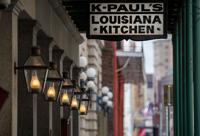
K-Paul’s Louisiana Kitchen shut down permanently in July 2020. The restaurant was one of the most famous and influential restaurants in New Orleans. (Photo by David Grunfeld, NOLA.com, The Times-Picayune | The New Orleans Advocate)
K-Paul’s Louisiana Kitchen, 416 Chartres St. The closing of these doors echoed around the food world. It was among the city’s biggest culinary names and most influential restaurants, where the legacy of chef Paul Prudhomme continued. It closed for good in July after 40 years, with the business name retired and the building up for sale.
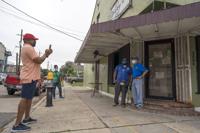
Even though it was closed, Malik Bartholomew, left center, of Know NOLA Tours, brought tourists James St. Hill and his wife, Hawa, left, both of Charlottesville, Virginia, to Li’l Dizzy’s Cafe so they could see the much-loved restaurant in New Orleans on Tuesday, November 10, 2020. Bartholomew poses for a photo with owner Wayne Baquet. (Photo by Chris Granger | The Times-Picayune | The New Orleans Advocate)
Li’l Dizzy’s Café, 1500 Esplanade Ave. This was the last outpost for the Baquet family’s restaurant legacy, a story that reaches back to the 1940s through generations of Creole flavor. An important facet of community life in the Treme, it closed when the pandemic began; proprietor Wayne Baquet later made official his decision to retire. The restaurant is up for sale now.

Cake Cafe & Bakery on Chartres Street opened in the Marigny in 2007.
Cake Café & Bakery, 2440 Chartres St. For breakfast, a special occasion cake or just a dose of neighborhood life, Cake Café was a Marigny mainstay for more than dozen years before closing in June. The address is now home to Louise, a café relocated from its original CBD spot. Cake Café founder Steve Himelfarb has since published a cookbook.
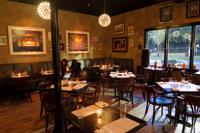
Meauxbar on North Rampart Street serves contemporary bistro cuisine in an upscale/casual setting.
Meauxbar, 942 N. Rampart St. An intimate neighborhood bistro that made this part of the French Quarter feel a little more like a neighborhood, going back to its first incarnation in 2003. Later part of the LeBlanc + Smith group, it closed in October. Chef John Bel is now cooking at sister restaurant Cavan, and others from Meauxbar’s staff are at the group’s other properties.

Patrons at Mimi’s in the Marigny rub shoulders over drinks and tapas.
Mimi’s in the Marigny, 2601 Royal St. Bars have faced their own excruciating prospects in the crisis. This one was also a restaurant, with a tapas menu that for many years provided some of the best late-night eats in the city. Don’t count out a second incarnation, but co-founder and namesake Mimi Dykes confirmed that Mimi’s “no longer lives at the corner of Royal and Franklin,” its prominent Marigny address since opening in 2002.

Cafe Luna has been a neighborhood fixture for Uptown since 1992 at the corner of Magazine and Nashville streets.
Cafe Luna, 802 Nashville Ave. An Uptown standard for three decades, this coffee shop evolving through changing trends and tastes with a consistent role as a neighborhood café, a welcoming nook and a needed respite. It closed in October.
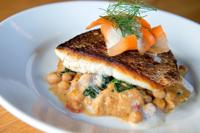
The red snapper over chick peas with shrimp sausage at DTB restaurant, located on Oak Street.
DTB, 8201 Oak St. A year after chef/co-owner Carl Schaubhut died from cancer, the modern Louisiana restaurant he created shut down for good. The address is now Jazzy Pete’s Po-boys.
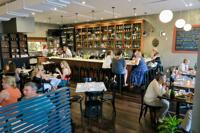
Bar Frances, a wine bar and bistro for upscale/casual dining on Freret Street.
Bar Frances, 4525 Freret St. The bistro that gave Freret street’s restaurant row an upscale/casual option closed early in the pandemic. Its chef, Marcus Woodham is now at its sister restaurants, the Bower and Claret (which have essentially merged into one restaurant during the crisis).
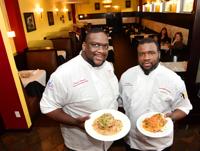
Chefs/Owners Louis E. Brown III and Same Faciane with the eggplant Napoleon and smothered catfish at Southern Charm Bistreaux and Bar.
Southern Charm Bistreaux, 2020 Belle Chasse Hwy., Gretna. A promising new addition for original Creole flavor with an upscale/casual approach was gaining steam when the shutdowns arrived. After shifting formats to try to fight through, it closed this fall. Chefs Louis Brown II and Sam Faciane hope to bring it back in a different location late in 2021.

The Semolina location in Metairie’s Clearview Mall is the last for a brand that once had 25 locations.
Semolina, 4436 Veterans Blvd., Metairie. Born in New Orleans in the 1990s, Semolina grew to become a regional brand with two dozen locations. The last one shut its doors at the Clearview Mall in June. Co-founder Greg Reggio confirmed that he does plan to open a new version of Semolina sometime in the future.

Jane Srisarakorn works the espresso maker at her coffee shop Arrow Cafe, which has a view to passing streetcars on North Rampart Street.
Arrow Café, 628 N. Rampart St. One of the newcomers bringing energy and momentum to Rampart Street in the French Quarter, it was a tiny spot with big character. It closed in October.
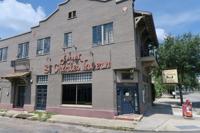
St. Charles Tavern, a longtime 24-hour restaurant in New Orleans, after closing down in the pandemic.
St. Charles Tavern, 1433 St. Charles Ave. A 24-hour tavern that was a salvation for night owls and late shift workers alike closed in July.
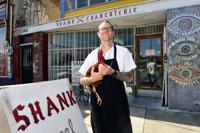
Kristopher Doll opened Shank Charcuterie on St. Claude Avenue.
Shank Charcuterie, 2352 St. Claude Ave. Kristopher Doll’s old-school, whole animal butcher shop had a diner counter with a view of the butcher’s craft and robust examples of its result. It closed in November.
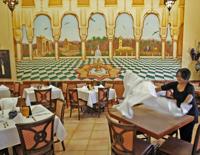
Leyla Aviles prepares a table at Casablanca restaurant in Metairie, a Kosher restaurant for Middle Eastern flavors.
Casablanca, 3030 Severn Ave. In business for 25 years, with a Middle Eastern menu and a specialty in Moroccan dishes, it served a unique niche in the community with its Kosher kitchen and catering operation. Losses after Hurricane Zeta‘s power outage proved the last straw.

Smothered okra with shrimp is a marquee dish at Sassafras Restaurant, a traditional Creole eatery.
Sassafras, 2501 Leon C. Simon Dr. The Duckworth family has a long history in Creole cooking, going back to their Lake Plaza restaurant in the 1980s. This location by UNO is closed indefinitely, along with a second location in the CBD. The family does hope to open a new restaurant in the future.

Traditional pho is the calling card of Nine Roses Cafe in the French Quarter.
Nine Roses Café, 620 Conti St. The café-style offshoot from the Nguyen family’s much larger Nine Roses in Gretna, it provided a much-needed Vietnamese option in the French Quarter. The main restaurant across the river remains open.

The bakery cafe Shake Sugary on St. Claude Avenue closed in July.
Shake Sugary, 3304 St. Claude Ave. Part of the early revival in neighborhood bakeries, known for fantastic king cakes, scones and sweet potato biscuits, its address is now being turned into Rosalita’s Backyard Tacos, slated to open soon.

Chef Marlon Alexander opened Cru in the former home of Feelings Cafe in Faubourg Marigny.
Cru by Marlon Alexander, 535 Franklin Ave. An upscale, contemporary restaurant in what is still widely remembered as the old home of Feelings Café shut down early in the spring.
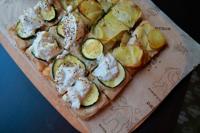
Staff photo by Ian McNulty – Potato rosemary pizza and pizza with zucchini and ricotta from Bonci Pizza, a brand founded in Rome that expanded to New Orleans.
Bonci Pizzeria, 726 Julia St. A brand with roots in Rome was part of a wave of new downtown eateries to open in 2019, this one offering pizza slices cut with scissors and sold by weight.
Morton’s the Steakhouse, 365 Canal St. Part of a national chain, it was a long-time presence in the Canal Place mall with its own following (and was a magnet for Saints players), until closing in May.
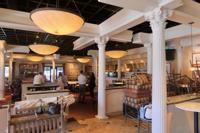
The former home of Bravo! Italian Kitchen at Metairie’s Lakeside Mall will become a Tavola, a new restaurant from Creole Cuisine Restaurant Concepts.
Bravo!, 3413 Veterans Blvd., Metairie. Another national chain that had its own following after 20 years in business by the Lakeside Mall. As of late December, the location is now home to a Tavola, a new Italian restaurant from local company Creole Cuisine Restaurant Concepts.

The surf-and-turf burger at the Standard, made with beef and crab patties.
The Standard, 4206 Magazine St. This neighborhood café opened on a bustling stretch of Magazine Street in 2015. It’s address is now home to Red Gravy, which relocated from the CBD.
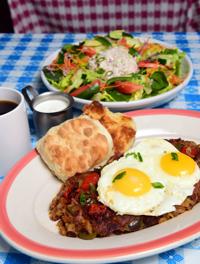
Eggs top corned beef hash at Polly’s Bywater Cafe.
Polly’s Bywater Café, 3325 St. Claude Ave. A neighborhood breakfast spot that got its start in 2017, it closed in the spring and is now home Stuph’D Beignets & Burgers, which relocated from Gentilly over the summer.
Nacho Mama’s, 1000 S. Clearview Pkwy., Elmwood. The long-running Mexican restaurant, which started as a CBD burrito bar and grew into a full-service restaurant, closed its last location in Elmwood in late March.
Sammy’s Po-Boys, 901 Veterans Blvd., Metairie. Though it remained open for takeout in the early going, this mom-and-pop po-boy shop closed for good (not to be confused with Sammy’s Food Service & Deli, a different restaurant that remains open in Gentilly). Its address is now home to the Store, which relocated from the CBD.
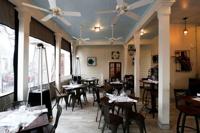
Bordeaux opened in 2019 at the corner of Magazine and Bordeaux street in Uptown New Orleans.
Bordeaux, 4734 Magazine St. Just a year old when the crisis hit, this Uptown bistro with its largely outdoor format folded and has since become Misa, a sister restaurant to the more casual Tal’s Hummus next door.
Also, as noted above, some restaurants with multiple locations trimmed back.
For instance, the Munch Factory closed its Lower Garden District spot, while keeping its Gentilly location; Satsuma closed its newest café in the Lower Garden District, while its original Bywater café and its Maple Street location remain open. Congregation Coffee Roasters closed its less-than-year-old CBD spot, keeping its original in Algiers Point. And Reginelli’s Pizzeria at 3244 Magazine St. closed, while other locations, including another further up Magazine Street, continue.
A number of restaurants have closed while their operators have kept the locations and transformed them into different restaurants. It’s a different approach to manage change, though for fans of the original restaurants it has the same effect as an outright closure.
Some examples: Andy’s Bistro in Metairie, now home to a second Three B’s Burger & Wine Bar, run by the same family; and Namese, the Mid-City Vietnamese restaurant, slated to open soon as a second location of Boil Seafood House, from the same operator.
With so much attention now focused on Louisiana in crisis, maybe Louisiana people can also show what helps us power through dire adversity.
This column is part of an ongoing look at how New Orleans restaurants are contending with the pandemic.
The biggest pot chef Isaac Toups has in his arsenal is a crawfish cooker, and on Thursday afternoon he had it filled to the brim with gallons …

